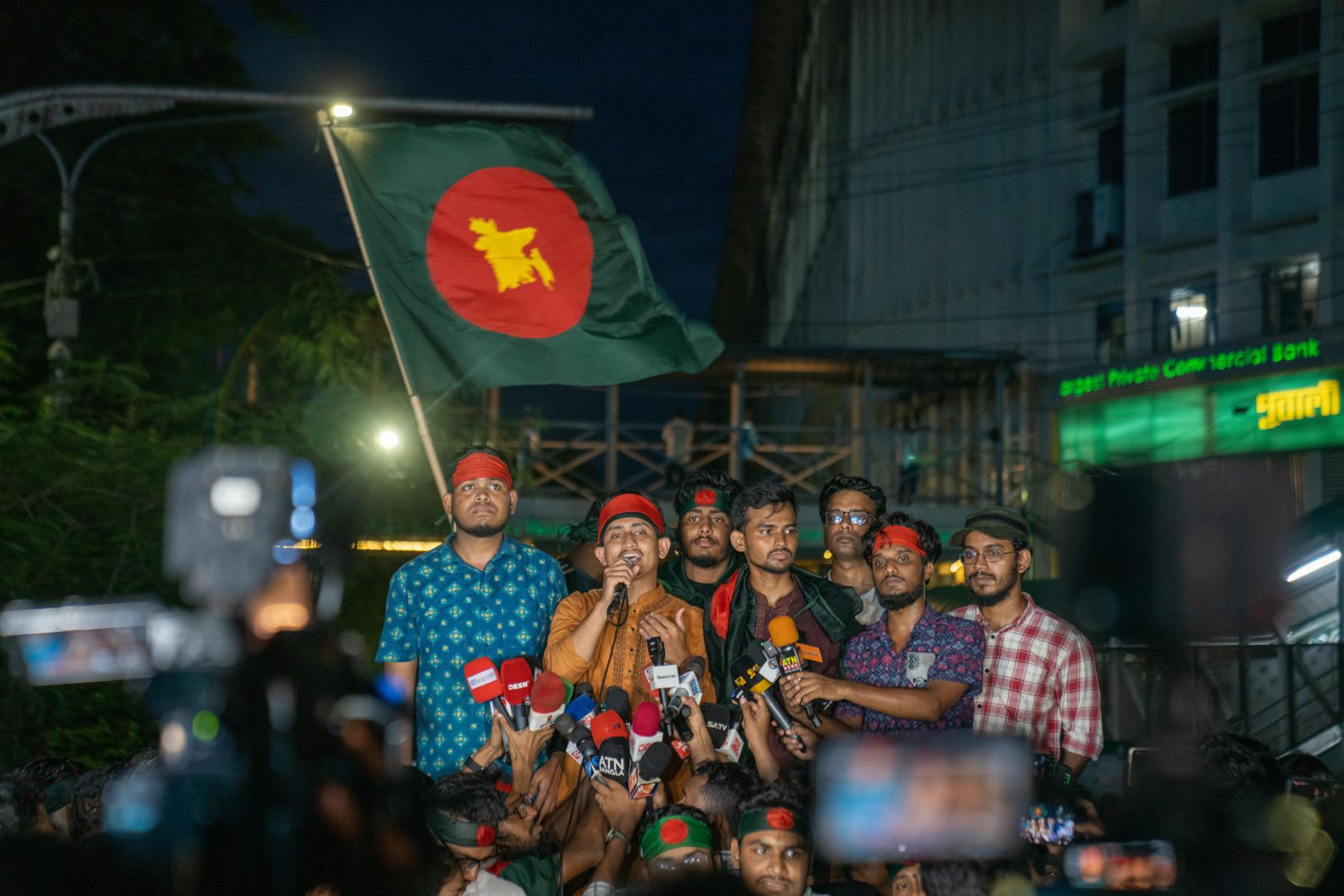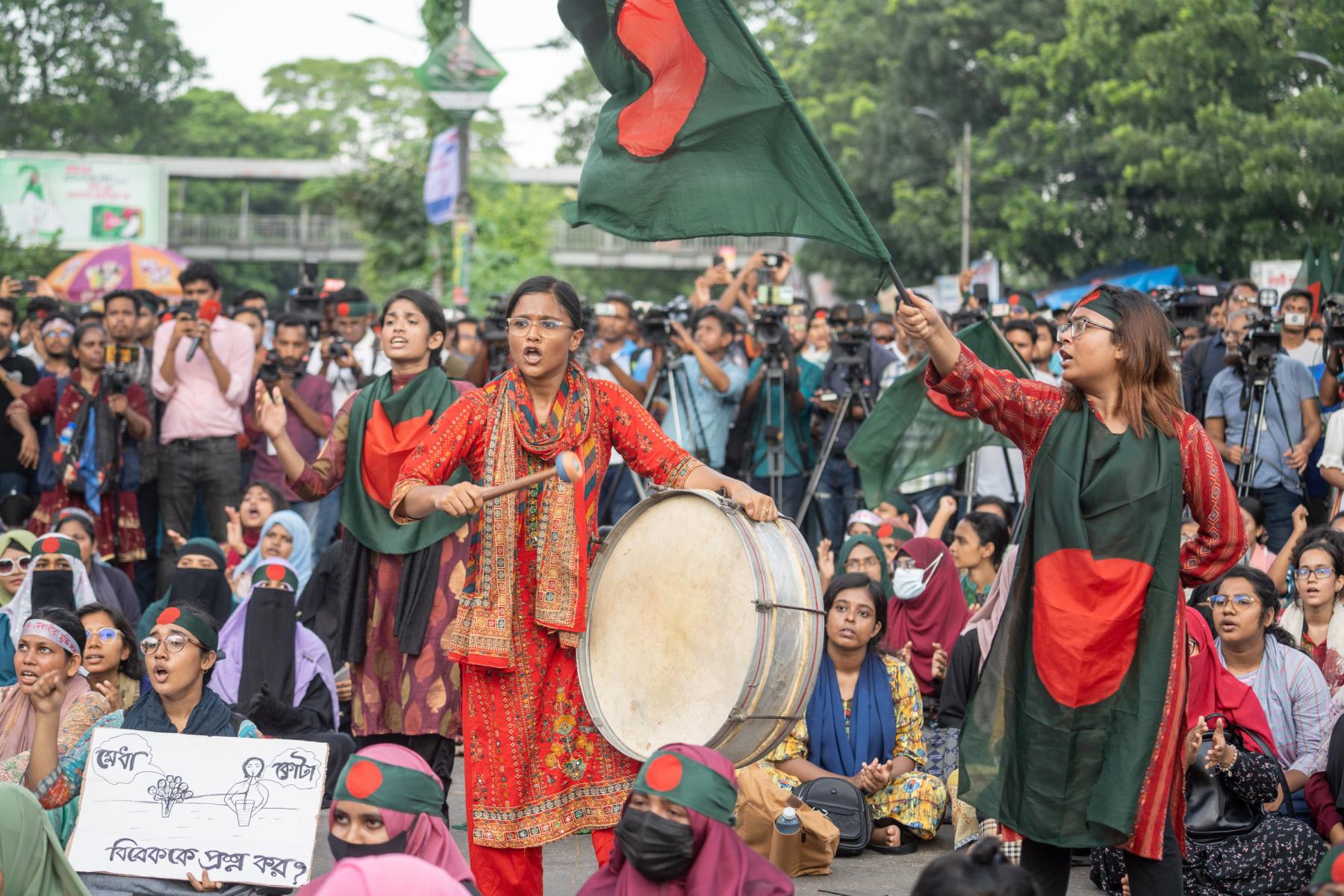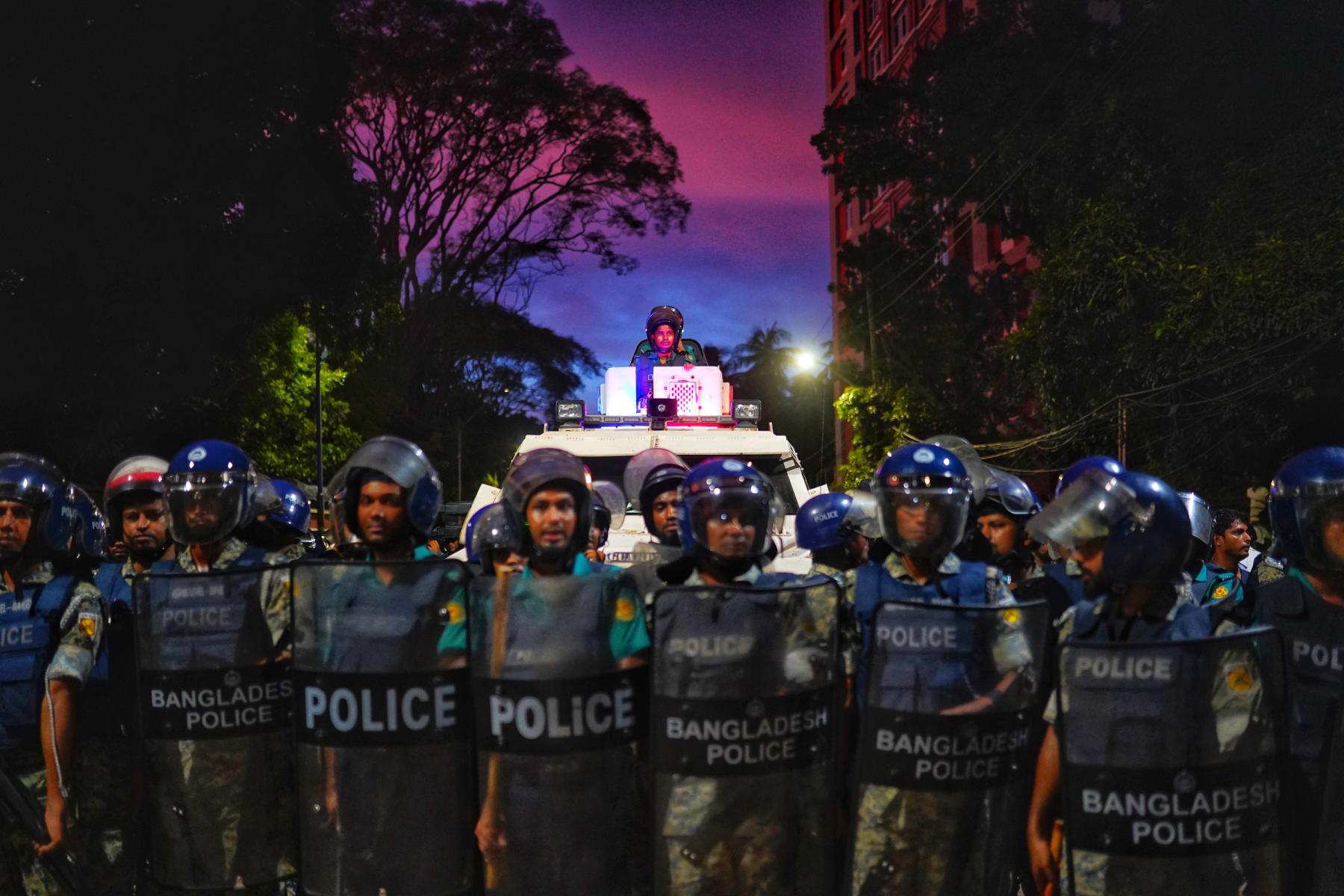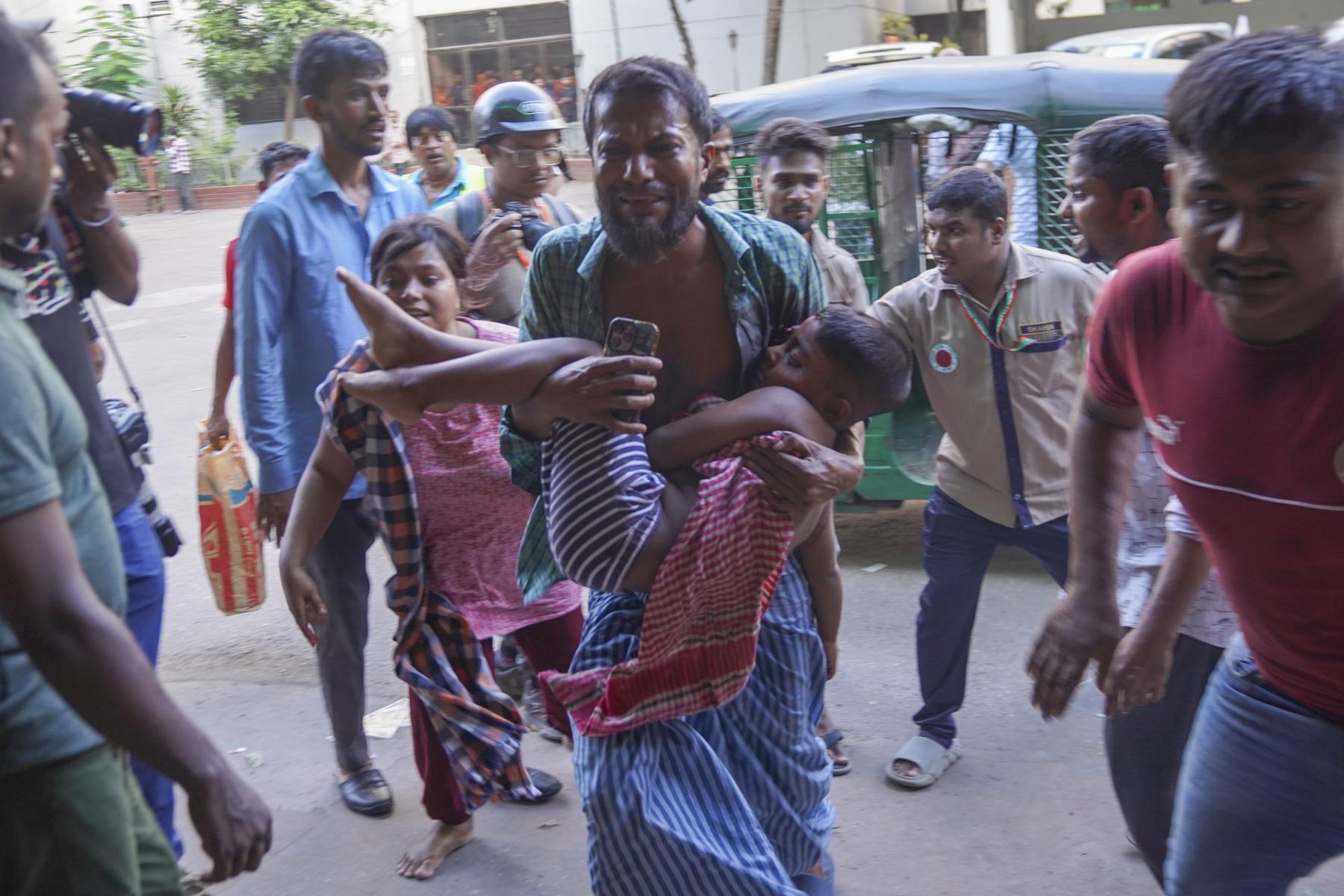Lobbying, Pimping, Sycophancy: The Denial of Repression in Bangladesh
The word dalal is a very useful word in Bangla. I have not come across an exact equivalent in English. The dalal combines the qualities and some of the functionalities of a lobbyist, a pimp and a shameless sycophant all rolled into one. You get them in all shapes and forms: dalal media, dalal intellectuals, dalal business leaders and dalal bureaucrats. If you need to get something done in a corrupt government office, the first person you contact is a dalal. Since all government offices are corrupt, you always go through a dalal. Filthy though the mechanism is, the system works.
The quota reform protesters (many of whom were non-students) clashed with law enforcers. (Rampura, Dhaka, Bangladesh, 19 July 2024.)
There is a hierarchy amongst dalals. There is the common or garden variety, or just the plain dalal. Uchu dorer dalals are generally advisers to the government, high officials in embassies and spokespersons at international platforms. Then there are chhechra dalals who do menial tasks and are lower in the political hierarchy. The talk shows on TV generally have the mid-level dalals, but chhechra dalals also have a presence. There are instances when chhechra dalals work their way right to the top and into ministerial positions. Uchu dorer dalals are often well spoken, sometimes sophisticated. You could imagine having a reasonable conversation with them on art or philosophy. Politics becomes a bit difficult as that is where the inconsistencies show up. Balanced discussions suddenly become very partisan. Often to the extent that they lose all sense of perspective and essentially turn into chhechra dalals, pretty much mimicking the party line no matter how ridiculous it sounds. The plain dalals and chhechra dalals appear everyday, as ‘experts’ on TV, political analysts, and sometimes as representatives of civil society, or even as ordinary people. Parroting government propaganda, they spew out the spin and the vitriol. They, too, must be desperate. Knowing the sentiment on the streets, to lie so brazenly must take courage. Or perhaps, having sold their soul to the devil, they are prepared for the hell that must follow.

Quota reform movement coordinators address the press with the national flag (featuring a design that was used during the 1971 liberation war) in the background. (Shahbagh intersection, Dhaka, 8 July 2024.)
The standard practice that the government has adopted towards anyone who questions government policy by labelling them a ‘terrorist’ and ‘anti-liberation’ is deeply insulting to people who are committed to the principles of egalitarianism, social justice and democracy—the underlying principles of the war of liberation of Bangladesh. It is precisely because the current government has strayed so far away from those principles that the students have questioned the regime. For the government to turn around and accuse the protestors of being ‘traitors’ hurts to the very core.

Students play drums and wave the national flag along with placards reading “Quota/Talent, ask yourself” as they demand reform in the quota system for government jobs. (Shahbagh intersection, Dhaka, 8 July 2024.)
It was the prime minister’s comments that the protestors were razakars (collaborators of the Pakistani army) that had enraged them. The fact that the state minister for information labelled Abu Sayeed, the heroic protester who was brutally killed by the police, a ‘junkie’ because he was brave enough to be defiant, points to the depth that the regime has sunk to. Only a party bereft of all values can be so insulting to a shahid (martyr), who gave his life defending the rights of his fellow students. Abu Sayeed’s working-class parents have lost their loving son. His mother’s wail was directed at the PM. “So okay, you wouldn’t give my son a job, but why did you have to kill him?”
Anti-quota protesters join in a funeral prayer with a dummy coffin at the University of Dhaka, remembering those who died the previous day during the clash between Bangladesh Chhatra League (the student wing of the ruling party, Bangladesh Awami League) and anti-quota protesters. (Dhaka, 17 July 2024.)
This is reminiscent of the transport minister in 2018, who had laughed when students protested the deaths of their fellow students, Abdul Karim Rajib and Dia Khanam Mim, during the road safety movement. So, faced with student deaths, we have a PM who calls them razakars, a transport minister who sneers at them and an information minister who calls them junkies. This is the sensitivity they have towards the public, the values they represent. I would not be surprised if there is a new surge of violence and even more deaths result from this callous comment. The PM wanted to know who the instigators of the violence were. She should point to the mirror and to her fellow cabinet members. The uchu dorer dalals. Her gangster cadre and the police were merely foot soldiers fanning the flames.

Members of Bangladesh police and Ansar Guard Battalion (AGB) are deployed in front of Dhaka University’s Shahidullah Hall to quell students demanding quota reform in government jobs. (Dhaka, 15 July 2024.)
The students had been on a peaceful protest, making—by the government's own admission—reasonable demands. The gazette that the government hurriedly passed on Tuesday (23 July 2024) could have been done in 2018. The verdict issued by the Supreme Court on 21 July 2024 could have been given before the violence began. The government could have admitted their mistake and promised to make amends instead of the PM making her callous faux pas. Instead, she unleashed armed goons backed by the police. “We have absolute trust and confidence in you and will do the needful,” the media dalals say glibly. “We want you as PM for life,” businessmen dalals coo. Basking in dalal culture, she smiles.

Ahad, aged 4, being carried by his father to the emergency gate of Dhaka Medical Hospital on 19 July 2024. Ahad died the following day, while undergoing treatment for a bullet that struck him in the eye and lodged in his head. This incident took place on the evening of Friday, 19 July 2024, at a house in Rayerbagh, Jatrabari. (Dhaka, 19 July 2024)
The long convoy of armoured personnel carrier (APC) tanks in Dhanmondi and the helicopter flying in between buildings are designed to instil fear. The side wall of the helicopter was completely removed. It was battle-ready. Who were they fighting? Having lost both the ethical and the intellectual battle, muscle is the only weapon the government has left. Terrorising the public is their only defence. The security forces will protect the citizens, says the home minister. The citizens are the ones the security forces are terrorising.
A Rapid Action Battalion (RAB) helicopter seen in the sky during a clash between police and protesters as violence erupted across the country after anti-quota protests by students in Paltan area. (Dhaka, 19 July 2024.)
To learn more about Shahidul Alam’s life and work, view Gulmehar Dhillon’s curated album from Alam’s retrospective at the Rubin Museum of Art, New York (2019), Najrin Islam’s essay on Sofia Karim’s Turbine Bagh and Annalisa Mansukhani’s conversation with Akshay Mahajan about the exhibition Kaghazi Pairahan. Also read Subhrojyoti’s poem “A better place”, inspired by Shahidul Alam’s photograph “A Last Goodbye”.
All images are courtesy of the Drik Picture Library, 2024.




